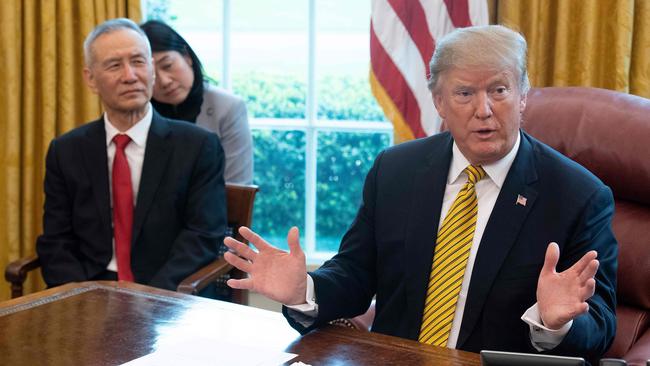China mulls walking from talks as Trump threatens tariff hikes
Beijing is mulling scotching talks after Trump threatened a swift hike of tariffs on Chinese goods.

Donald Trump’s threat to increase tariffs on $US200 billion ($286bn) of Chinese goods by the end of this week has surprised officials in Beijing and China is considering cancelling trade talks set to begin this week, according to a person briefed on the matter.
In a tweet earlier this morning, the US President accused Beijing of moving too slowly to resolve the trade war between the two nations.
He also threatened to impose tariffs on an additional $325bn ($465bn) of Chinese goods “shortly” if there is no truce reached between the two countries.
The dramatic and unexpected threat from the president has cast doubt on the ability of negotiators to strike a crucial deal to defuse the tariff trade war before Mr Trump’s new deadline of this Friday (Saturday AEST).
“The Trade Deal with China continues, but too slowly, as they attempt to renegotiate. No!” Mr Trump tweeted.
“The 10 per cent (tariffs) will go up to 25 per cent on Friday. 325 Billions Dollars of additional goods sent to us by China remain untaxed but will be shortly, at a rate of 25 per cent.”
....of additional goods sent to us by China remain untaxed, but will be shortly, at a rate of 25%. The Tariffs paid to the USA have had little impact on product cost, mostly borne by China. The Trade Deal with China continues, but too slowly, as they attempt to renegotiate. No!
— Donald J. Trump (@realDonaldTrump) May 5, 2019
Mr Trump’s tweets surprised many Chinese officials, a person briefed on the matter told The Wall Street Journal on Monday, and China is considering cancelling trade talks that are to resume in Washington starting Wednesday (Thursday AEST)). There has been widespread expectations in recent days that an accord could be reached by Friday.
“China shouldn’t negotiate with a gun pointed to its head,” the person said. A decision on whether to go ahead with the talks this week hasn’t been made, the person said.
Chinese officials have said Beijing wouldn’t bend to pressure tactics. By potentially scotching the trip, Beijing would be following up on its pledge to avoid negotiating under threat.
Some experts suggested the president’s comments were aimed at pressuring the Chinese in the final phases of discussions to agree to more favourable conditions for the US.
The president has already imposed a 25 per cent duty on $US50bn worth of Chinese hi-tech goods, and a 10 per cent duty on another $US200bn worth of Chinese products. That 10 per cent had been scheduled to go to 25 per cent at the end of last year, but Trump delayed that action to provide time for negotiations.
If there is no deal reached between the two countries, Mr Trump has said he will not only raise tariffs from 10 per cent to 25 per cent on $US200bn worth of Chinese goods but will also slap tariffs on an additional $325bn of goods.
Mr Trump’s threat came just days before Chinese Vice Premier Liu He is due to arrive in Washington on Thursday (AEST) for the next round of discussions of reaching a trade deal.
Mr Trump’s top economic adviser Larry Kudlow said the president was “issuing a warning to China” over the negotiations.
“I’m a free-trade guy. The president’s tariffs, however, have been extremely useful in negotiating … If it doesn’t work out, then I think what the president is saying in today’s tweet is that we will continue these tariffs,” said Mr Kudlow, who is National Economic Council Director.
He also said that “structural issues and enforcement issues remain” when it comes to China’s trade practices.
“China has got to end its unfair, non-reciprocal trading system. They’re breaking the laws,” he said.
Treasury Secretary Steven Mnuchin said last week that recent talks between Chinese and US officials in Beijing had been “productive” and had bought the two countries closer to a resolution.’
Among the remaining sticking points is China’s desire for the US to immediately remove its punitive tariffs after a deal is reached. The US want to keep some tariffs in place until it sees that China is faithfully carrying out the terms of any deal.
Mr Trump wants any deal to include a commitment by China to purchase significantly more US good and services and a commitment from Beijing to stop forcing US companies doing business in China to surrender their technology secrets.
Under Mr Trump’s presidency, the US has increased tariffs on about half of all imports from China in an attempt to reduce the size of the trade deficit between the two countries and also to pressure China to adopt more open and fair trade rules.
China has retaliated by impose its own tariffs on around 70 per cent of its imports from the US. The US tariffs have hurt the Chinese economy while in the US, farmers have been hit hard by the trade war.
The ongoing dispute has rattled world markets and has unnerved third-party countries like Australia, which fear the global economic ramifications of a prolonged trade war between the economic superpowers.
With Dow Jones
(Cameron Stewart is also US Contributor for Sky News Australia)




To join the conversation, please log in. Don't have an account? Register
Join the conversation, you are commenting as Logout